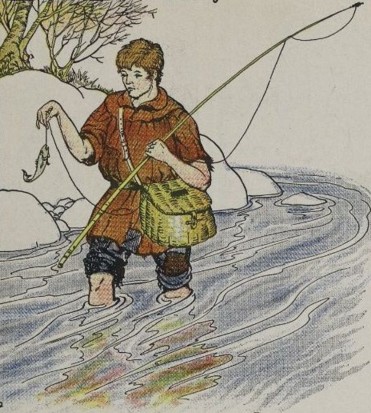PART A_1
Let’s learn vocabulary. Listen and repeat the words and the sentences with your tutor.
PART A_2
| 1. spare | /spair/ |
| -to not hurt or destroy something or someone | |
| He begged the policeman to spare him from punishment. | |
| 2. worthwhile | /wurth-WAHYL/ |
| -useful, important, or good enough to be a suitable reward for the money or time spent or the effort made | |
| My stay in the countryside was worthwile. | |
| 3. foolish | /FOO-lish/ |
| -resulting from or showing lack of sense | |
| She does not like talking to people she finds foolish. | |
| 4. gain | /geyn/ |
| -an occasion when you get something useful or positive | |
| The knowledge he got from studying was a huge gain. | |
| 5. promise | /prom-IS/ |
| -the act of saying you will certainly do something | |
| Keeping a promise is important. |
PART B_1
Let’s read the story. Please read them aloud, and I will check your pronunciation and intonation.
PART B_2
The Fisherman and the Little Fish

A poor Fisherman, who lived on the fish he caught, had bad luck one day and caught nothing but a very small fry. The Fisherman was about to put it in his basket when the little Fish said:
“Please spare me, Mr. Fisherman! I am so small it is not worth while to carry me home. When I am bigger, I shall make you a much better meal.”
But the Fisherman quickly put the fish into his basket.
“How foolish I should be,” he said, “to throw you back. However small you may be, you are better than nothing at all.”
A small gain is worth more than a large promise.
PART C_1
Let’s answer comprehension questions. Please answer them based on the story.
PART C_2
| 1. | What did the fisherman catch on the day he had bad luck? |
| 2. | What did the fish promise the fisherman when it was caught? |
| 3. | How did the fisherman respond to the fish? |
PART D_1
Let’s discuss the story. Please answer the questions below and express your opinions.
PART D_2
| 1. | What makes the fable interesting for you? |
| 2. | How would you describe the fisherman? |
| 3. | If you were the fisherman, would you have eaten or spared the fish? |
| 4. | Share an experience where you gained something great from taking advantage of a situation. |
| 5. | Do you save things for later? e.g. new clothes, food, money. Why or why not? |
REVIEW AND FEEDBACK
Now, let us review the things that you learned in this lesson.
ではこのレッスンで学んだことを振り返りましょう。
(Please give a short feedback on how your student did on your class.)
| Grammar 文法 |
Pronunciation 発音 | Vocabulary 単語 |
Comprehension 理解 |
|
|---|---|---|---|---|
 GOOD GOOD |
文法の誤りはほとんどなく、完全な文章で話すことができる | ほとんどの単語をはっきりと正しく発音することができる | 習った表現を適切に使うことができる | 文章を理解し、質問に正しく答えることができる |
 FAIR |
文法の誤りはあるが、完全な文章で話すことができる | 発音の練習が必要な言葉がいくつかある | たまにミスはあるが、習った表現を適切に使うことができる | 文章を完全に理解するのは難しく、質問に正しく答えられないときもある |
 POOR |
文章で話すのは難しく、単語だけで話すことができる | 発音の練習が必要である | 習った単語と表現を少しだけ使うことができる | 文章を理解するのは難しく、質問に答えるのは難しい |
Parts of this lesson material are based on:
An eBook from The Project Gutenberg.
This eBook is for the use of anyone anywhere at no cost and with almost no restrictions whatsoever. You may copy it, give it away or re-use it under the terms of the Project Gutenberg License included with this eBook or online at www.gutenberg.org
An eBook from The Project Gutenberg.
This eBook is for the use of anyone anywhere at no cost and with almost no restrictions whatsoever. You may copy it, give it away or re-use it under the terms of the Project Gutenberg License included with this eBook or online at www.gutenberg.org